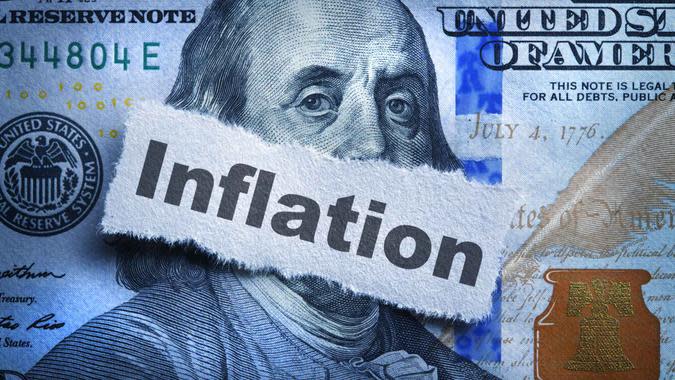Experts: 6 Dumb Things People Do With Their Retirement Accounts After Retiring

Like most working adults, you’ve probably been keeping at least a casual countdown toward retirement in your mind. Maybe you’re planning to travel the country. Maybe you want to relax in the home you’ve worked so hard for. Whatever your heart’s desire may be, you want your golden years to shine brightly.
Find Out: Here’s the Cost To Retire Comfortably in Every State by Age
Read Next: Do This To Earn Guaranteed Growth on Your Retirement Savings (With No Risk to Your Investment)
However, even the savviest planner can make some financial mistakes around their retirement. To discover some of the most common no-no’s around retirement, GOBankingRates turned to financial experts for their insights. After all, it’s better to learn from other people’s mistakes than your own.

Cashing in Retirement Accounts Too Early
If you start wondering what the beaches look like in Florida this time of year every time you look at your 401(k), you should throw a cold piña colada on any thoughts about cashing out early. You’re not only risking incurring taxes and other potential penalties, you’re also draining a source of future income.
Thinking about tapping into Social Security early, even to support living expenses, also comes with its risks. GOBankingRates previously reported on the pitfalls of claiming your Social Security benefits before you reach full retirement age.
Check Out: 9 Ways Frugal Retirees Spend Their Social Security Checks
Be Aware: How a Trump Win in 2024 Could Impact Your Retirement Savings
Sponsored: Owe the IRS $10K or more? Schedule a FREE consultation to see if you qualify for tax relief.

Taking a Part-Time Job Without Thinking About Taxes
While retirement seems like it should offer a reprieve from workaday worries like taxes, retirees have their own unique concerns when it comes to paying the taxman on time. For instance, if you’re not interested in going back to the office full time, but found a part-time gig that fills your days, some part of your Social Security benefits might be subject to taxes — depending on the combined income.
Dr. Lei Han, CPA, associate professor of accounting at Niagara University, reminds individual retirees that, if they have a combined income of between $25,000 and $34,000, up to 50% of their Social Security benefits could be taxed. When combined income climbs past $34,000, up to 85% of Social Security benefits might be taxable.
Retirees with part-time jobs or other sources of income should monitor their combined income levels and prepare to potentially pay taxes accordingly.
For You: Cutting Expenses in Retirement: 9 Things To Downsize (That Aren’t Your Home)

Not Paying Attention to Inflation
Elizabeth Pennington, senior associate at Fearless Finance, often sees retirees shifting their funds into stable assets that are vulnerable to inflation. As many people live longer and enjoy their retirements well into their golden years, Pennington says that retirees must consider inflation over the long-term.
“With many retirements lasting over 30 years now, inflation risk is a significant concern, and investing a lot in stable assets leaves you more exposed to that risk,” she said.
Her suggestion for retirees is to go for a healthy balance of bonds and stocks to help grow retirement income.

Being Too Conservative with Investments
Taylor Kovar, CFP, the founder and CEO of 11Financial and the CEO of The Money Couple, also sees retirees act a little too cautiously with their portfolios out of anxiety about volatility in the market.
Focusing on cash and bonds is an understandable impulse toward self-protection, but it can also limit portfolio growth and hinder long-term financial stability.

Neglecting To Update Beneficiaries
It’s easy to put off updating your beneficiaries on your retirement accounts — after all, it’s hardly your most pressing daily concern. Until, one day, it becomes a big and immediate issue.
If you haven’t updated your beneficiary designation, Kovar said you risk passing your assets to unintended heirs or even ex-spouses.
“It’s essential for retirees to review and update beneficiary designations regularly to ensure their assets are distributed according to their wishes,” he said.
Learn More: 7 Bills You Never Have To Pay When You Retire

Not Paying Attention to Your RMDs
People with some retirement plans, like 401(k)s or traditional IRAs, must start taking required minimum distributions (RMDs) once they’ve reached a certain age, generally around 72 years old. Dr. Han said failing to take RMDs on time can risk a 25% penalty on the amount you haven’t withdrawn.
Kovar didn’t mince words on the issues neglecting RMDs can cause for seniors: “Many retirees overlook or delay planning for RMDs, leading to avoidable financial consequences,” he said.
More From GOBankingRates
What Makes a Good Bank in 2024, According to a Banking Expert
I'm a Personal Finance Writer: These Are the Worst Money Mistakes I Made in 2023
This article originally appeared on GOBankingRates.com: Experts: 6 Dumb Things People Do With Their Retirement Accounts After Retiring
